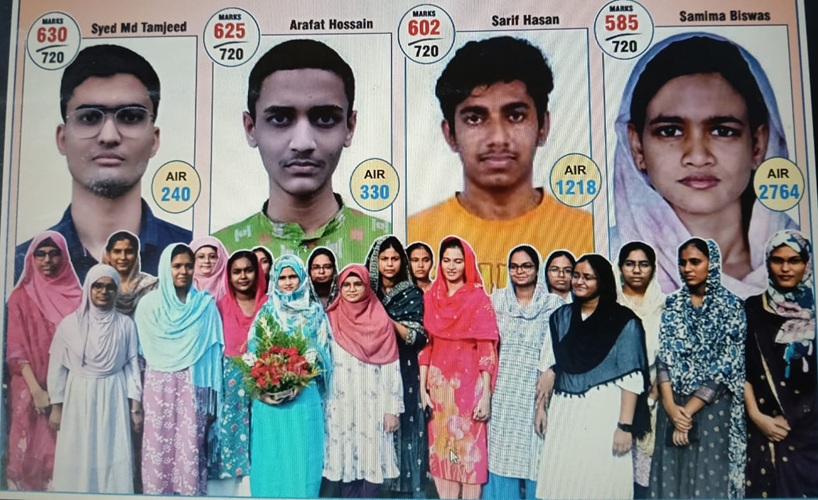By Pervez Bari
BHOPAL -Several lakhs of Muslims,including Islamic scholars and intellectuals drawn from across the globe, led byMaulana Muhammad Sa’ad Kandhalvi, chief of the “Tableeghi Jama’at”, wailed for help before the Almighty Allah in the mass “Dua” (Supplications) in a mix of Arabic, Urdu and Hindi.
As soon as the “Dua” started pin drop silence prevailed but resonated at short intervals with Aameen (Amen) of the huge assemblage while Maulana Sa’ad pleaded with the Almighty Allah for forgiveness of one and all. The assemblage with tearful eyes made the whole ambience around at the Ijtema site very solemn. Thus, with the mass “Dua“, which lasted for about 22 minutes, the curtain came down on the 77th edition of the 4-day Aalami Tableeghi Ijtema (World Preachers’ Congregation) on Monday last.
Maulana Sa’ad while pleading for World peace and Humanity to prevail requested Almighty Allah to protect all the Auqaf properties, Masajid, Madrasas, orphanages etc. which are presently under the threat to being usurped.
Meanwhile, an aura of spirituality pervaded through Madhya Pradesh’s capital Bhopal, the city of lakes, hills, Mosques and Mandirs too during the four day event. A tent city spread over 600 acres of land had come up about 15 kms on the northern outskirts of Bhopal city at Ghasipura in Eintkhedi village with a huge “pandal” to house the “Jama’ats” (Groups of devotees) who had descended here. To manage the massive influx of people, 45,000 volunteers were deployed. Seventy parking lots were made over 300 acres, ensuring sufficient space for the large number of vehicles.
Bhopal’s Tableeghi Ijtema 3rd biggest gathering of Muslims
Bhopal’s Aalami Tableeghi Ijtema is considered as the third biggest gathering of Muslims after Hajj and a similar congregation in Bangladesh. The venue of the “Tableeghi Ijtema” had turned into a sea of humanity. Many people had to trek several kilometres to reach the site as vehicular traffic was not allowed to avoid congestion.
Continuing the “Dua” Maulana Sa’ad, who is the grandson of “Tableeghi Jama’at” founder Maulana Muhammad Ilyas, from the headquarters at Hazrat Nizamuddin in New Delhi, sought divine blessings for peace, progress and unity of Muslim Ummah and mankind at large. He prayed to Allah Almighty to bless the entire world with His final message so that the entire mankind could succeed in the eternal life.
Maulana Sa’ad solicited from the Allah to forgive people’s sins, to overlook the mistakes and lethargy of the Ummah and end our life on dependence. He solemnised, “We are guilty, show us the righteous path and inspire us so that we could follow the path of Prophet Mohammed (PBUH). We have wandered and are nervous, we are victimised, show us the righteous path”, he added.
People also took part in “Dua” from nearby homes, on the roof tops of houses and buildings, sitting on roadsides or shops or on trees. Apart from “Jama’ats” from all over India, delegations from about three dozen foreign countries participated in the “Ijtema”.
Muslims urged to lead upright life
Earlier, before the “Dua” Maulana Sa’ad in his religious discourse urged Muslims to lead an upright life in this world so that they could be rewarded in the life hereafter. He stressed them to become messenger of peace so that humanity at large could benefit from them. He highlighted the importance of Namaaz and emphasized the need to acquire Islamic teachings. He also emphasised on recitation of Quran and called on the Ummah to go through its translation if they do not know Arabic language so that they understand the message of Allah (S).
Maulana Sa’ad called upon Muslims to purge themselves of mundane pursuits and devote more time to ameliorate their infinite life in the world hereafter by total submission to Allah Almighty. He urged the people to first purge themselves of the sins and then reach out to more and more people to convey the message of Allah Almighty, which is obligatory upon the followers of the Holy Prophet Muhammad (PBUH).
History of Tableeghi Jama’at
It may be mentioned here that “Tableeghi Jama’at” is a transnational religious movement which was founded in 1926 by Maulana Muhammad Ilyas, a religious scholar of the orthodox Deoband, in India in the erstwhile Mewat province which is now part of Haryana. The movement primarily aims at Islamic spiritual reformation and awakening to the world Muslims by working at the grass roots level, reaching out to Muslims across all social and economic spectra to bring them closer to the practices of Prophet of Islam Muhammad (PBUH).
“Tableeghi Jama’at” came forth as an offshoot of the Deobandi movement. Its inception is believed to be a response to Hindu revivalist movements, which were considered a threat to vulnerable and non-practicing Muslims. It gradually expanded from local to national to a transnational movement and now has followers in over 150 countries.
It may be recalled here that Maulana Ilyas learned the situation. His initial effort was to establish a network of mosque-based religious schools to educate Mewati Muslim about correct Islamic beliefs and practices. But he became disillusioned with the reality that these institutions were producing religious functionaries but not preachers. Following this, he quit his teaching position at Madrasah Mazhar-ul-Uloom in Saharanpur and moved to Basti Nizamuddin in the old quarters of Delhi to begin his missionary work. “Tableeghi” movement was formally launched in 1926 from this place.
Maulana Ilyas devoted to what he described as “the mission of the prophets”. His message was simple: “Aye Musalmano Musalman Bano”. The method adopted by him was equally simple. It was to organize units of at least ten persons and send them to various villages. These units (Jama’at), would visit a village, invite the local Muslim to assemble in the mosque and present their message in the form of six demands: 1. Every Muslim must be able to recite Shahadah correctly in Arabic; 2. A Muslim must learn how to say the Salaat (Namaaz) correctly; 3. To learn the basic teachings of Islam and to do Zikr; 4. To respect the fellow Muslims; 5. To inculcate honesty and sincerity of purpose in such endeavours and 6. To spend some times and travel from place to place spreading the words of Allah.






0 Comments